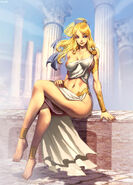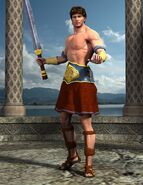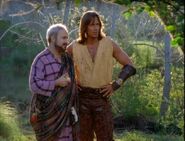The Hellenes are a national and ethnic group of European looking people that begun with the Ionians and the people of Pelasgus or the Pelasgians. Also called the Alexandrians by others, the Hellenes were affected by the Phoenicians (through the Danaans and the Yosians) and the people who came before them.
Appearance[]
As the picture above attests, the Hellenes looked fully homogenous with other White peoples in Mesopotamia, Southwest Asia and Anatolia, and most of Northern and Western Europe. they are certainly not the olive skinned Hellenes presently. They all looked fully European based on the accounts in the Iliad.
Menalaeus was described as having red hair and ivory white flesh. Odysseus is described as having golden hair. Polyneices is described as also having golden blonde hair. Ethnic Hellenes have the appearance of Western Europeans. They have European faces, European skin tones, and European hair tones. To say that the peoples of Hellas today are olive skinned is a mistake according to the Ancients. The whole of the Hellene nation miscongeniated with the mixed peoples of the Arabian pennisula in later times.
Origins[]
The Ionians[]

Poetic symbol of the Ionians.
The Ionians (Greek: Ἴωνες, Íōnes, singular Ἴων, Íōn) were one of the four major tribes that the Greeks considered themselves divided into during the ancient period, alongside Dorians, Aeolians and Achaeans (Achaeans was a colloquial name for Mycenaeans).[1] The Ionian dialect was one of the three major linguistic divisions of the Hellenic world, together with the Dorian and Aeolian dialects.
The Ionians are the descendants of Iavan or Yavan, or as we render, Javan. They were descendants of a son of Japheth. The Ionian Greeks are called Yavanas by the Behistun Rock and were identified by the East Indians as Yavanas. The Ionian Greeks once inhabited Anatolia and many of it's islands, and were also the founders of Eprus and, it seems to be, Athens. The sons of Javan include: Tarshish, who settled in Southern Spain; Rhodanim, which are the Greeks of the island of Rhodes; and Kittim, who settled in Cyprus.
When referencing populations "Ionian" defined several groups in Classical Greece. In the narrowest sense it referred to the region of Ionia in Asia Minor. In a broad sense it could be used to describe all speakers of the Ionic dialect. This also included the populations of Euboea, the Cyclades and many colonies founded by Ionian colonists. Finally, in the broadest sense, it could be used to describe all those who spoke languages of the East Greek group which included Attic.
The foundation myth, that was current in the Classical period, suggested that the Ionians were named after Ion, son of Xuthus, and lived in the north Peloponnesian region of Aegilaus. When the Dorians invaded the Peloponnese and expelled the Achaeans from the Argolid andLacedaemonia the Achaeans moved into Aegilaus (henceforth known as Achaea) and the Ionians were in turn expelled.[2] The Ionians moved to Attica and mingled with the local population. Later many people emigrated to the coast of Asia Minor founding the historical region of Ionia.
Unlike the austere and militaristic Dorians the Ionians are renowned for their love of philosophy, art, democracy, and pleasure - Ionian traits that were most famously expressed by the Athenians.[3]
The Pelasgians[]
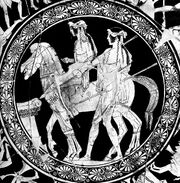
Symbol of the Pelasgians, with Castor beside his brother, Polydeuces.
The name Pelasgians (Greek: Πελασγοί, Pelasgoí; singular: Πελασγός, Pelasgós) was used by some ancient Greek writers to refer to populations that either were the ancestors of the Greeks or preceded the Greeks in Greece, "a hold-all term for any ancient, primitive and presumably indigenous people in the Greek world".[1] In general, "Pelasgian" has come to mean more broadly all the indigenous inhabitants of the Aegean Sea region and their cultures before the advent of the Greek language.[2] This is not an exclusive meaning, but other senses require identification when meant. A tradition also survived that large parts of Greece had once been Pelasgian before being Hellenized. These parts generally fell within the ethnic domain that by the 5th century BC was attributed to those speakers of ancient Greek who were identified as Ionians.
The Pelasgians are descendants of Peleg (Castor), who was alive "when the Earth was divided." While Peleg's more famous son would have Abraham and Melchezidek as grandsons, the many other sons and daughters he had wandered about the land, finding themselves in Thessaly. The Pelasgians are remotely related to Joktan (Polydeuces) who moved into the East into China and disappeared into the Han Chinese. The Pelasgians spread throughout the whole of Greece, and when the Danaans of Greece came -- claiming to be of the family of Io -- they were often identified with the Pelasgians.
The Danaans[]

A Hellene of Danaan descent.
In Greek mythology, the perceived cultural divisions among the Hellenes were represented as legendary lines of descent that identified kinship groups, with each line being derived from an eponymous ancestor. Each of the Greek ethne were said to be named in honor of their respective ancestors: Achaeus of the Achaeans, Danaus of the Danaans, Cadmus of the Cadmeans (the Thebans), Hellen of the Hellenes (not to be confused with Helen of Troy), Aeolus of the Aeolians, Ion of the Ionians, and Dorus of the Dorians.
Kadmos from Phoenicia, Danaus from Egypt, and Pelops from Anatolia each gained a foothold in mainland Greece and were assimilated and Hellenized. Hellen, Graikos, Magnis, and Macedon were sons of Deucalion and Pyrrha, the only people who survived the Great Flood; the ethne were said to have originally been named after the elder son Graikoi but renamed later after Hellen who was proved to be the strongest. Sons of Hellen and the nymph Orsiis were Dorus, Xuthos, and Aeolus. Sons of Xuthos and Kreousa, daughter of Erechthea, were Ion and Achaeus.

Helen of Troy, a Danaan Hellene, idealized pick by GENZOMAN.
The Danaans are actually members of the Tribe of Dan. They traveled to Greece before the Migration of the Israelites out of Egypt and founded Argos, the oldest of the ancient cities of Classical Hellas. The Danaans came from Egypt into the land of Argolis and declared that they were to rule because they were of the family of Io (Israel).
The Aegean Danaans, however, became part of the Sea Peoples that eventually became trouble for Israel. When the Israel side of Dan conquered Liaish and renamed it Dan, they kept in close contact. The Danaans remained in their ships when Deborah did battle against Israel's enemy Sisera at the time. More members of Dan went into Greece and founded Mycenae (which means New Canaan) and other cities, demanding of the Ionian Greeks that they should lead because they were of Io (Israel). The Danaans built wonderful cities in Greece -- Argolis, Aulis, Mycenae, and Sparta. Judahites came after the first group, and founded Athens. Those of Ephraim also followed Dan and founded Corinth.
So, if the Danaans were of the tribe of Dan, what would that make the Trojan War? Well, Archaeology has proved that there was a Troy and that ash was found between the sixth and seventh layers of Troy. A war did happen between the Danaans and the people of that particular Troy, who were the descendants of Judah through Zarah. Why was it fought? Homer said it was fought to retrieve a man's wife. Back then, it was a real reason to go to war. But Troy controlled trade through the Bosphorus Straits. Certainly there was another reason to go there and beat up the Trojans. But what ever the reason, Archaeology cannot prove that there was a woman named Helen and the war was fought for love. We have only the tales of the poets for that.
The Trojan War is definitely Greece's national epic. It is probably the only story the Mythographers could prove that is essentially and originally Greek. The other Mythographers and their tales? Well, since the Danaoi, the Dorians, and the Athenians were all Israelites, then it stands to reason that probably most of their tales are corrupted tales from the Bible.
The Aeolians[]
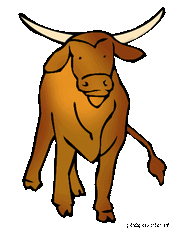
The Wild Aurochs, symbol of Ephraim. (Chinese bull by Philip Martin.)
The Aeolians (Greek: Αἰολεῖς) were one of the four major tribes in which Greeks divided themselves in the ancient period (along with the Achaeans, Dorians and Ionians). Their name derives from Aeolus, the mythical ancestor of the Aeolic branch and son of Hellen, the mythical patriarch of the Greek nation. The dialect of ancient Greek they spoke is referred to as Aeolic.
Originating in Thessaly, a part of which was called Aeolis, the Aeolians often appear as the most numerous amongst the other Hellenic tribes of early times. The Boeotians, a subgroup of the Aeolians, were driven from Thessaly by the Thessalians and moved their location to Boeotia. Aeolian peoples were spread in many other parts of Greece such as Aetolia, Locris, Corinth, Elis and Messenia. During the Dorian invasion, Aeolians from Thessaly fled across the Aegean Sea to the island of Lesbos and the region of Aeolis, called as such after them, in Asia Minor.
The Aeolian greeks are, to both their credit and their infamy, are descendants of both the tribes of Ephraim and Manasseh, the house of Joseph. Being descendants of the man that is now identified as Thales and Pythagoras, the Aeolians come from the city of Dor in Israel. Because of this, they are known as the Dorians, or the Dorian Hellenes. They founded the city of Corinth and many other cities, and spread through most of Hellas at that time. All of this happened before the first recorded Olympiad (776 B.C., or Ol. 1).
The Hellenes today[]
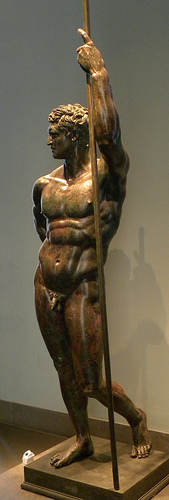
Hellenistic Prince .
Having become united as one people, the Hellenes today share traits with their Ionian ancestors, the Pelasgians, the Dorians, the Danaans, and the Aeolians. However, they are falling into a state of overpopulation and many of their young men and families have gone into the Alexandrian Kingdoms to find opportunity elsewhere.
Hellenes today are extremely fair and pleasant to look upon, compared to the Achemeniads, or the Aryavartans, or even the Phoenicians. While blonde hair is rare amongst them, they greatly admire red and auburne hair in their women. They love to philosophize and debate amongst each other the various philosophies of men -- whether spoken of by Thales, or by Pythagoras, or some other philosopher. The debates rage on, given rise to many philosophies: from Neoplatonism, to Cynicism, to Neopythagoreanism. Also, many other gods are worshipped instead of the Creator.
Led by Alexander the Great some fifty years ago, they conquered vast territories until Alexander the great burned himself out. A truely progressive leader, he put many laws in place that would see that Women were given respect and a place of equal opportunity; laws against homosexuality; and other laws contributing to a Free and Open Society within his Empire. When his Empire shattered, his generals struck down many of the laws he set up. Only in Phaeselis, or Alexandria on the Phoenix, was his laws concerning their freedom were not struck down.
In the other kingdoms, Homosexuality is acceptable as long as the boy taken as a lover can marry. Pederasty is openly practiced, and some men look forward to and speak of pride when the day will come when their youthful sons become beautiful enough to catch a man's eye. The laws promising women equal opportunity were struck down, but they are no longer to be kept within the home.
However, only in Phaeselis were the laws creating an open and free society set up by Alexander were honored and respected.
Racial Traits[]
- Ability Score Racial Traits: Human characters gain a +2 racial bonus to one ability score of their choice at creation to represent their varied nature.
- Size: Humans are Medium creatures and thus receive no bonuses or penalties due to their size.
- Base Speed: Humans have a base speed of 30 feet.
- Bonus Feat: Humans select one extra feat at 1st level.
- Skills: Humans gain an additional skill rank at first level and one additional rank whenever they gain a level.
- Languages: Humans begin play speaking Common. Humans with high Intelligence scores can choose any languages they want (except secret languages, such as Druidic). See the Linguistics skill page for more information about these languages.
Additional Traits[]
The following racial traits may be selected instead of existing human racial traits, for Hellenes. Consult your GM before selecting any of these new options.
Adoptive Parentage: Humans are sometimes orphaned and adopted by other races. Choose one humanoid race without the human subtype. You start play with that race's languages and gain that race's weapon familiarity racial trait (if any). If the race does not have weapon familiarity, you gain either Skill Focus or Weapon Focus as a bonus feat that is appropriate for that race instead. This racial trait replaces the bonus feat trait.
Dual Talent: Some humans are uniquely skilled at maximizing their natural gifts. These humans pick two ability scores and gain a +2 racial bonus in each of those scores. This racial trait replaces the +2 bonus to any one ability score, the bonus feat, and the skilled traits.
Eye for Talent: Humans have great intuition for hidden potential. They gain a +2 racial bonus on Sense Motive checks. In addition, when they acquire an animal companion, bonded mount, cohort, or familiar, that creature gains a +2 bonus to one ability score of the character's choice. This racial trait replaces the bonus feat trait.
Heart of the Slums: Humans who eke out a life in a city's teeming slums must be quick and clever. They gain a +2 racial bonus on Sleight of Hand and Stealthchecks, and a +4 racial bonus on Survival checks in urban and underground settings. In addition, they may roll twice when saving against disease, taking the better roll. This racial trait replaces skilled.
Heart of the Streets: Humans from bustling cities are skilled with crowds. They gain a +1 racial bonus on Reflex saves and a +1 dodge bonus to Armor Class when adjacent to at least two other allies. Crowds do not count as difficult terrain for them. This racial trait replaces skilled.
Heart of the Wilderness: Humans raised in the wild learn the hard way that only the strong survive. They gain a racial bonus equal to half their character level onSurvival checks. They also gain a +5 racial bonus on Constitution checks to stabilize when dying and add half their character level to their Constitution score when determining the negative hit point total necessary to kill them. This racial trait replaces skilled.
Heroic: Some humans are born heroes. In campaigns that use the optional hero point system, each time these humans gain a level, they gain 2 hero points instead of 1. If they take the Blood of Heroes feat, they gain 3 hero points each level instead of 2. This racial trait replaces the bonus feat trait.
Traits of the Hellenes[]
Character traits are abilities that are not tied to your race or class. They can enhance your skills, racial abilities, class abilities, or other statistics, allowing you further customization. The following traits are common to Hellenes.
| Addict | Adopted | Adventurous Explorer |
|---|---|---|
| Blessed | Charming | Chosen One |
| Classically Schooled | Hard to Kill | Finding a Friend |
| Second Tongue (Old Cults | Skeptic | Tactician |
References[]

